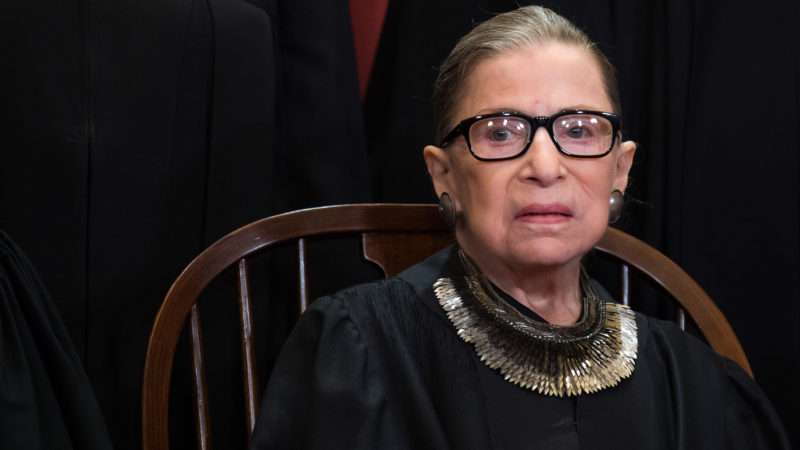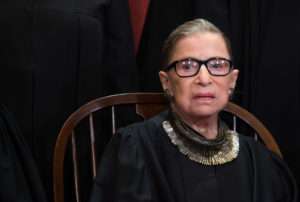As many of you know, I was a Ginsburg law clerk on two separate occasions—when she was on the appeals court, and then again during her first term at SCOTUS. I know that RBG was perhaps not the favored Supreme Court Justice for many of the readers of this blog—which is fair enough—but I hope you will allow me some personal reminiscences as we all process the meaning of her death and, more importantly, her life and legacy.
I owe Ruth Ginsburg a great deal. My grades were pretty good when she hired me the first time, but, as she herself often admitted, two things got me over the hump in competition with all the other law students whose grades were pretty good: first, that I had an asterisk on my CV, to indicate that I had stayed home with my infant daughter Sarah for the first two years of her life while my wife continued working (RBG liked that arrangement a lot!), and, second, that instead of using one of my boring law school practice memos as a writing sample, I used a paper I had written on “Contract Law in Richard Wagner’s Ring Cycle” (and she really liked that).
Most of what I know about writing I learned from her. The rules are actually pretty simple: Every word matters. Don’t make the simple complicated, make the complicated as simple as it can be (but not simpler!). You’re not finished when you can’t think of anything more to add to your document; you’re finished when you can’t think of anything more that you can remove from it. She enforced these principles with a combination of a ferocious—almost a terrifying—editorial pen, and enough judicious praise sprinkled about to let you know that she was appreciating your efforts, if not always your end-product. And one more rule: While you’re at it, make it sing. At least a little; legal prose is not epic poetry or the stuff of operatic librettos, but a well-crafted paragraph can help carry the reader along, and is always a thing of real beauty.
She had the kind of fierce integrity that I think we all would want to see in a judge; she was always determined to get it right, to do right by the litigants and to do right by the law. She had her biases and her blind spots; we all do. But I have often said that if my life were on the line, I’d be happy if she were on the bench, because she would be as fair-minded when weighing the evidence as one could ever ask for.
By an unfortunate coincidence, the two years I clerked for her (’86-7 and ’93-4) were marred by some personal tragedies in my own life; my brother-in-law, Howard Eisen, died unexpectedly in the spring of ’87, and my dad was diagnosed with cancer and died in the spring of ’94. RBG could not have been more supportive and comforting during what were difficult periods for me. When my dad was declining and it was clear he didn’t have much longer to live, she wrote to him and my mother, sending them her best wishes and saying all sorts of nice things about what a great law clerk I was, how proud they should be, how she couldn’t get along without my help, etc. etc. She knew, and I knew, and even my parents knew, that she was exaggerating for effect—but I was there with them when the letter arrived, and they both wept with joy and pride when they read it. It was a lovely thing for her to do, and I could never find the words to thank her enough for having done it.
During my time with her she—we—had some pretty rough encounters with some of her colleagues, notably Justices Starr, Bork, Scalia, and Williams on the DC Circuit and, of course, with Justice Scalia on the High Court. She could fight with the best of them—but I never heard or saw or even intimated anything other than respect and even, often, affection for her adversaries in these battles. No snide remarks, no nasty innuendoes, none of that. She valued civility and collegiality very, very highly, and I think she helped to dignify the process of judging, and helped make those she was working with better as a result.
And my personal favorite RBG moment: In 1994, I arranged for my daughter’s 6th grade class to come and take a tour of the Court. After walking through the main courtroom and the courtyards and the portrait galleries and the rest, we all gathered in the East Conference Room and RBG came down to talk to them. She took some questions from the kids—their teachers had made sure that the kids had thought of some questions beforehand, and they all came through; “How did you become a judge?” and “What’s the hardest part about being a judge?” and “Do you like being a judge?” and the like. Finally, she said she could take one more question before she had to go back to work, and it was “What case that you worked on that you enjoyed the most?”
So she told the story of Weinberger v. Wiesenfeld—the case from early on in her days at the ACLU Women’s Rights Project. Mr. Wiesenfeld, the plaintiff, had just lost his wife, leaving him alone with their newborn son. He wanted to take time off from work so he could stay home with the baby, but he discovered that he was not entitled to spousal benefits under the Social Security regulations—although if he had died, his wife would have received the supplemental payments. RBG took his case and won a famous victory in the Supreme Court. So she told the story, and then she added: “And just the other day that little boy wrote me a letter, to let me know that he had just been accepted to Columbia Law School …” It was a very touching moment—the teachers and parent/chaperones who had come along on the tour all had tears in their eyes, and even the 6th graders knew, deep down, that they had heard something pretty special from a pretty special person.
Her legacy is prodigious. She transformed American law through her work on equal rights for all, and, especially in her later years, she served as an inspirational symbol for millions of people—especially, though hardly exclusively, for millions of young girls who drew strength from her work and from her life.
One final recollection. One thing that RBG and I shared, besides our love of opera, was that we were both Brooklyn-born and -bred (and proud of it!). Earlier this year, when I was doing some research putting together a compilation of her writings, I came across this essay that she wrote for the Bulletin of the East Midwood Jewish Center (the synagogue in my old neighborhood) in 1946 when she was 13 years old. It is, I think, a fitting epitaph for a life very well-lived. R.I.P.
One People—An Essay by Ruth Bader, Age 13 (June, 1946)
Bulletin of the East Midwood Jewish Center, Brooklyn NY (June 1, 1946)
The war has left a bloody trail and many deep wounds not too easily healed. Many people have been left with scars that take a long time to pass away. We must never forget the horrors which our brethren were subjected to in Bergen-Belsen and other Nazi concentration camps. Then, too, we must try hard to understand that for righteous people hate and prejudice are neither good occupations nor fit companions. As Rabbi Alfred Bettleheim once said: “Prejudice saves us a painful trouble, the trouble of thinking.”
In our beloved land families were not scattered, communities not erased nor our nation destroyed by the ravages of the World War. Yet, dare we be at ease? We are part of a world whose unity has been almost completely shattered. No one can feel free from danger and destruction until the many torn threads of civilization are bound together again. We cannot feel safe until every nation, regardless of weapons or power, will meet together in good faith, the people worthy of mutual association. There can be a happy world and there will be once again, when men and women create a strong bond towards one another, a bond unbreakable by a studied prejudice or a passing circumstance.
Then and only then shall we have a world whose structure is the Brotherhood and Sisterhood of men and women.

from Latest – Reason.com https://ift.tt/2FHsD3Y
via IFTTT

